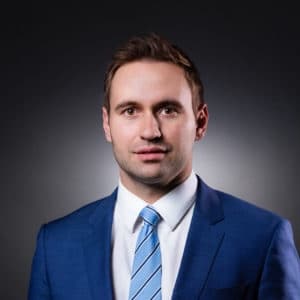Roider attorney discusses case

While the holiday season is usually quiet for the courts, defense attorney T.J. Matthes wrapped up 2018 by winning a murder trial in St. Louis City.
Just weeks into 2019, Matthes was introduced to a case unlike any he had previously seen.
This was the case of Waterloo’s Kyle Roider, who was recently found not guilty of first degree murder and aggravated battery with a firearm.
The day after Roider, then 30, was arrested in connection with the shooting death of Steven Becker, the Rosenblum, Schwartz & Fry law associate received an early morning phone call from a general practitioner of law in Monroe County.
“I remember when he called me it was in the early morning on that Saturday after Kyle got arrested on Friday and we talked about the trial I had just won in St. Louis City. He asked if I would be able to take care of Kyle and of course I said yes,” Matthes recalled.
Matthes quickly learned that other than a common charge (and eventual not guilty verdicts in both cases), Roider’s case was substantially different from the State of Missouri v. Justin Moore, the case he had won weeks before.
“Justin Moore was charged with murder and it occurred at a gas station in South St. Louis City and Justin didn’t do it. That was the defense – that he didn’t do it. The jury found him not guilty and that was sort of the end of it,” Matthes explained. “Kyle’s case was a self defense case, and so I said a million times throughout the trial that Kyle shot Steven Becker, and so (there were) totally different dynamics going on in the case.”
Nevertheless, Matthes automatically knew he wanted to represent Roider.
“At that time I did not know what his diagnosis was, but just knowing that he had some mental health challenges and that he was being charged with first degree murder, it was appealing to me to be able to represent someone like that,” Matthes said.
After starting to work on the case, Matthes learned Roider had previously been diagnosed with schizophrenia. Having worked with the firm for approximately six years at that point – he was hired full-time after his internship there while studying law at Saint Louis University – this was Matthes’ first time representing a client with this mental health concern.
“The Constitutional principles that have been in place since (the founding of the country) that everyone is entitled to a lawyer (and) everyone is presumed innocent unless proven guilty by the state beyond a reasonable doubt protect everyone,” Matthes said. “I think that those constitutional principles especially protect people that struggle with things like schizophrenia if they get charged with crimes. Being able to represent someone in that position, I was excited by it.”
In order to be able to effectively represent Roider, Matthes consulted with various doctors, psychologists and books – primarily the Diagnostic and Statistical Manual of Mental Disorders, or DSM-5.
What Matthes found, and as psychiatry.org notes, “Most people with schizophrenia are not any more dangerous or violent than people in the general population.”
Matthes knew he had to ensure that the stigma surrounding the disorder would not infringe on his client’s right to a fair trial.
This led to him having an honest discussion with the jury panel. He said he started the conversation by telling the panel that while he knows most people with the disorder are not violent, the first thing that often comes to mind when hearing about schizophrenia is “crazy” or violent people.
“One of my main concerns with this case is, ‘Do others have those thoughts? If they do, would that get in the way of presuming Kyle innocent, the fact that he has schizophrenia and he’s charged with murder? At the beginning of this case, do (they) presume him innocent?’” Matthes said. “I think that talking about that in jury selection and getting that out in the open was a good thing to do, and I think it was good for everyone to understand and go into that case having that conversation.”
As trial proceedings showed, drugs played a large role in the case, with Roider testifying to having used methamphetamine with Becker and others the week Becker died.
Matthes said this was not the only factor that complicated the case.
“When you get down to the nuts and bolts of a self-defense case, one thing that people always look at is the subsequent conduct. What happened afterwards, what did the guy do afterwards? Kyle didn’t call 911; he didn’t call the police. Kyle left Steve Becker’s body in the basement for multiple days. So, that was unlike a lot of self-defense cases we had in the past,” Matthes remarked.
Much of Roider’s testimony as the defense’s first (and only) witness, as well as the prosecution’s cross examination, centered around this crucial question: If Roider was not guilty, why did he leave Becker’s body in the basement?
“I know the jury wanted to know why he didn’t call the police. I know they wanted to hear that from him. I know the jury wanted to know why he left this man in his basement, and I wanted to make sure to have him directly answer those questions,” Matthes said. “(Since) Kyle shot him and it was justified … both times he pulled the trigger … (and) he thought it was justified the whole time, then why didn’t he call 911 when he was on that cell phone and he had a cell phone that whole time?”
When Matthes asked Roider why he had not called the police after Becker was fatally shot, Roider testified that he was “in shock” and “had not processed what happened.”
Before Becker’s body was eventually discovered days after the shooting, Roider had several communications with family members and visited a close friend. He told the court he could not get himself to accept what had happened, and so he was not able to tell others.
As Roider simply stated at trial, “It was a difficult thing to talk about.”
Despite the challenges of the case, Matthes said he was always confident the trial would yield a favorable result for his client.
Matthes contributes this to all-around consistency.
“Kyle was able to remember what happened and he was very consistent,” Matthes said. “Obviously Kyle is not an expert in blood splatter. Kyle is not an expert in pathology. Kyle is not an expert in crime scene investigations, and so from the beginning when he said what happened in that basement, everything was consistent with what was at that scene. Everything was consistent with what those who are experts in those fields had to say.”
The Monroe County Courthouse will soon see Matthes again, as he is representing a juvenile male who was charged in connection with an August 2019 stabbing in Waterloo.






